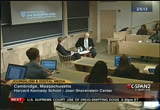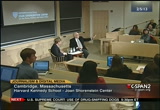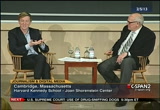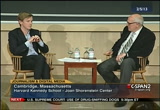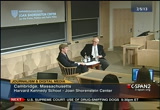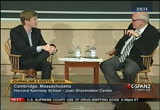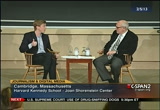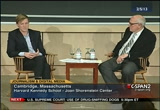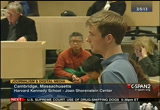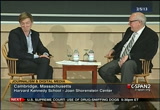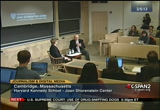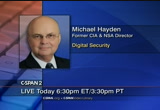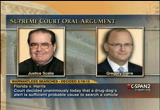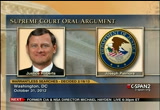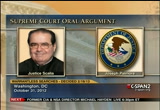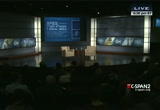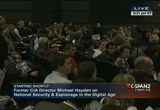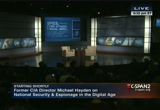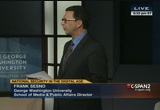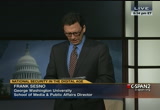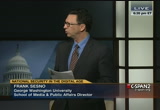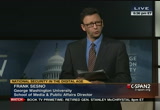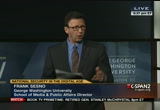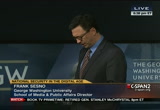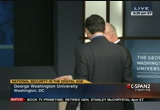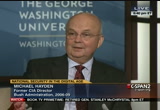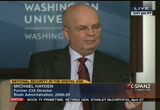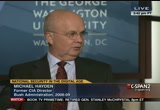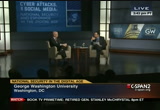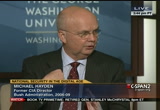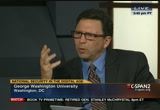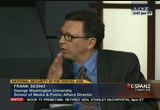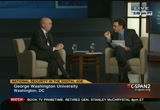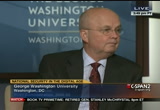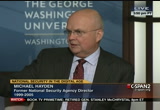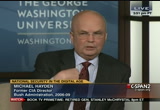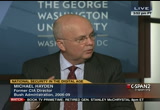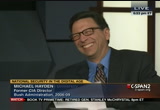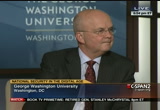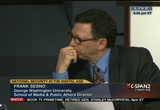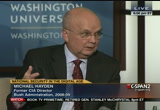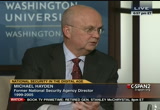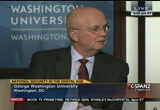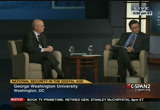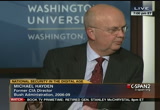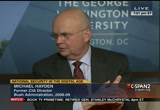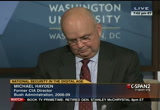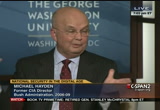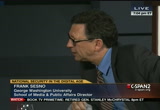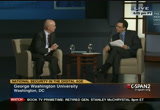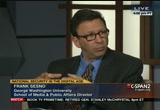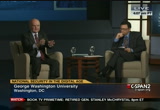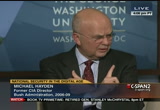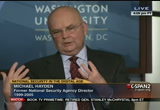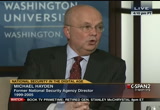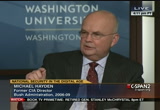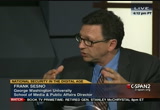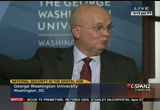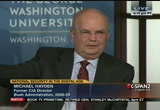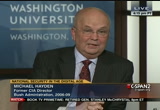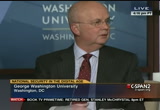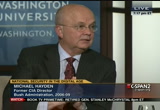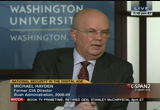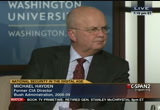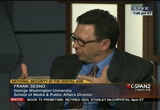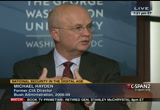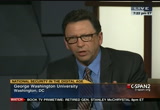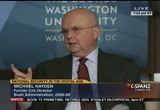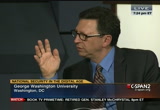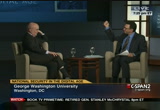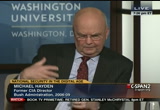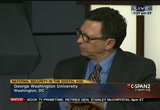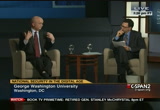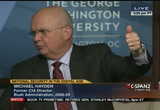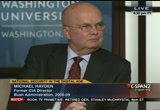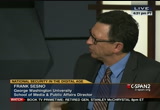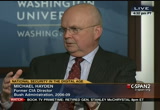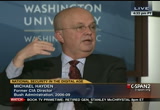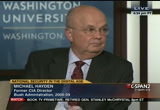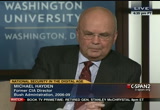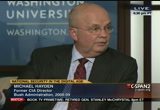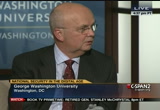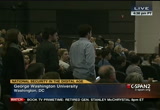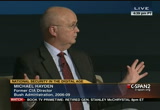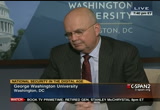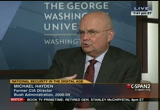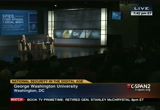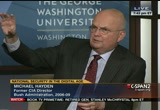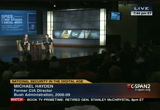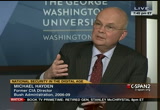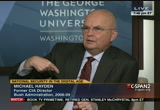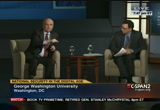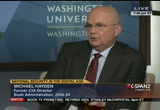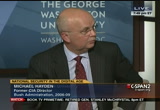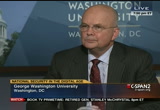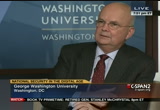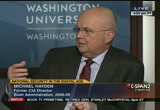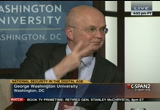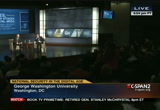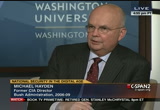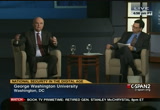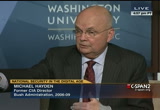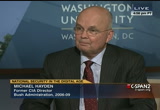tv U.S. Senate CSPAN February 19, 2013 5:00pm-8:00pm EST
5:00 pm
street in the course of the first term. it was incredibly well reported, alec could talk to all of these hedge fund guys, and the question is, you know, you sort of want to call them out and force them to think about whether or not their opinions are actually reasonable. but you're not going to be able to do that if the first thing they see if you're calling them a cry baby. ..
5:01 pm
and they want to read it and then it's really what it anchors the other side of new, so if that's the goal then i think a lot of the journalists on the left does do that but i also feel like there is a lot of people like myself who when it comes to opinion journalism i have plenty of it. everybody's got an opinion. i left rudder and a lot of the people that i read i have plenty of opinions and perspectives. i find what we found in a lot of conversations in the research we have done is that people want news sources that are thought-provoking, unbiased and in that category. i'm not talking about all different types of consumers in the category of educated politically savvy people to want unbiased coverage. >> we have questions for chris
5:02 pm
to coming in the lineup at the microphones. we are focused on a relatively specific group of people its college-educated folks that follow the news somewhat closely, very closely who are politically savvy but may not be politically upset. they want to know about four men the literature who are interested in politics and i think that level of focus enables us to have that perspective in a different way than if we were running a television network for if we were focusing on a larger more diverse demographic. >> for no wonder if you could address the opportunities you see on the horizon in engaging in a public audience is whether it is the next iteration of
5:03 pm
crowd sourcing or whatever it is, what better way is you see to engage the audience in ways that intersect in the to double lines that you've described that have impact both on your social consequence as well as your sustainability but it begins with ways to engage them in the journalism. estimate what we are trying to do from the editorial perspective is go to their readers rather than create new products that ask them to come to us. so being very much engaged in a conversation particularly on twitter and some extent facebook is an important strategic priority for what we are doing. we are also experimenting with ideas of trying to use the technology to engage in those dialogues in a way that hasn't been possible something like google hangout there's about 25 folks in new york and 30 people
5:04 pm
on staff in washington and we have big tvs and both of the conference room and have them connected with google hang out which sounds silly but you can just go into the conference room and that person goes into the conference room and maybe it isn't a face-to-face conversation but it's the next best thing to do we have a culture now what if our reporters were engaging in dialogue in michigan or one in washington with some of the experts he or she talked to with some of the people who were reading it and had a good criticisms of it and there's opportunities there that well well, that work clacks that is the culture of experimentation. i really want to try to see if it makes sense or doesn't.
5:05 pm
the social media environment is the place we have to go first when we are experimenting with all these things we know is important engaging on twitter and to some extent facebook whether it's reporters, the brand, everybody. islamic the next questioner i haven't seen in a long time to. if you do know she will be writing for the new republic. estimate to declare it interest it's very enthusiastic what you are proposing to do. it seems really good to me. the one question i have is about the association with the new republic with liberalism for the better part of a century to think about the new republic they think about it as a liberal magazine. how it will change under george
5:06 pm
leadership. >> what i don't want is for the new republic as an institution to have an editorial line where we get in the business of hiring or not hiring people because if we agree or disagree with a particular viewpoint. we want to practice this journalism that doesn't necessarily pretend to be, where the journalists pretend not to have certain judgments. one of the issues structurally with the media today is there's with newspapers he said this and she said that and let the leader of the side. what's great about them as they engage and learn and have an assessment and hopefully they included at a point of view on their assessment in their peace. a vast majority of our readers and writers are generally
5:07 pm
liberal folks and most if not all of them voted for obama to the and so i think they share a similar world view as the leaders but i didn't buy the magazine to expand a little outlet. i bought it for that type of journalism that we can do inside of it, which you know, different people can say different things about how that intersects. we did some qualitative. do you know the new republic? do you think it is liberal or conservative? 24% of people said conservative and 22% said the liberal. now as an owner of a magazine it's interesting when in washington and new york a lot of folks will say they used to support the editorial board and the iraq format or this and that
5:08 pm
and it's a very conservative. other people will have the opposite viewpoint and what i always end up saying is we don't have a party line anymore. we have a lot of reporters and a lot of different opinions and hopefully each one of them can help, some of them you love and hate that some of them will change how you think about the world around you. >> for you going to write a column or have anything in an explicitly? >> i haven't yet. i talk about the business. i'm spending most of my time on the business but it's also important in an initial period that i didn't buy the new republic and i'm not here to amplify my own voice or my own editorial positions. i did it to in power the people that do this for a living. >> identify yourself, please. >> i'm the editor-in-chief at
5:09 pm
the review of latin america and i also teach journalism. you do an amazing job of trying to blend the journalistic culture some. i know of the new republic going back many years. many of my students know the new republic through the movie shattered glass and which detected for those of you that don't know a major breach of journalism ethics and much of journalist was making things up. in the internet culture it's much more of the culture of passing things on and repeating things and in the print culture and "the new york times," the new republic and many other traditional magazines is what the public defended by firing a
5:10 pm
glass is true for but i was wondering as you take over this magazine what does your fact checking process look like and are you writing a new code of ethics, and in that could affect ethics how are you taking into account that you are trying to breach the two cultures? >> yes, fact checking is incredibly important to what we do but for two reasons. number one, because whatever we are publishing we want to make sure in fact they are citing the alike because it is ethically and it's what it means to have a sense of integrity as a publication, but it's all so incredibly important for us as a company has a brand one of the key differences between us and a lot of the other places you can find content on the web is we do have a brand, nearly 100 years of history and people have to be
5:11 pm
able to trust that the facts are right whether it is with stevan glass or a couple of episodes there have been lapses of the new republic hysterically and i think as a result, there's been even more people or even more on their toes now culturally to ensure that doesn't happen anymore we have a pretty robust researcher program and they along with other folks on the staff and reporters themselves are fact checking themselves several times through so it's important because that's the history and because it is important for us as a brand. >> does that episode still wonder why? i know jason blair does it at "the new york times". >> i think people are more mindful of the integrity of the journalism although most of that
5:12 pm
we hire bring such a sensitive integrity to it any way but because of that episode i think more people are aware that i know it from talking to some of the folks who were there at that time and also from the film it was an incredibly -- it would be bad luck for it to be turned into a good movie. >> do you have any plans on expanding beyond the u.s. for instance if to europe [inaudible] thank you. >> international coverage is really interesting. i think that we are trying every single print issue of the magazine in at least a couple times a week to always have
5:13 pm
international content in the next. so we have had reported pieces from venezuela or we had someone embedded in afghanistan and we ran up peace in the last two issues on that so it's really important. the question just from the business standpoint is the economics that more often than not it works best for us to work with freelance reporters contributing for us in "the new york times" as well so we can get the content in the magazines but we don't have the bureau in paris or coal or something like that -- kabul or something like that that is the key to having a broad magazine in the future. >> are you going to make it
5:14 pm
weekly again? >> i don't think so. we don't have any plans to. it was hysterically, the previous ownership brought it down to buy a weekly. when i first bought the magazine i was a little skeptical of the bi weekly format for a few different reasons, but in print i have really come around to that. it's often enough that we can be responsive to the news cycle - we need to tear up the cover of the day before, we can but it's slow enough that it's not every single week of reproducing the magazine so we are able to keep the content relatively high but strategically the way we think about it is we have a lot more people interfacing with our brand and reading are content on their web and on the phone and i had the way that we do for the print product. we still print from the economics perspective we make
5:15 pm
money off of print. but we really try to keep everybody aware of the fact that people come into the new republic each day a lot of times >> how are you going to feed that beast? >> we have invested a lot of capital into the digital content we had a reporter go to the consumer electronic show two weeks ago with 5,000 words which was absolutely fantastic looking at the culture in las vegas and the role of women and a theory and philosophy in the people that she meant it and was a great piece but it will never appear in print. mr. - student school at the
5:16 pm
kennedy school. you mentioned the idea of moving away from unique as a metric and maybe as a way to create a more financially sustainable system for online advertising and things. i'm wondering if you could elaborate on that and talk about what that actually what look like and if there are or a any organization is using that for the measurement. >> i just think we play some way too much emphasis on this. i think the amount of time spent on the side or reading a piece is really important. we use a few different analytical tools but one enables us not only to see how many people are reading but we can see how many are reading a piece in any given moment in time and how far down an article they get which is interesting because sometimes you will have a great
5:17 pm
headline that will get lots of people and who would have thought that journalism -- that many people wanted to know about that topic but you will have 70% of people drop-off after the first but then you have walter that just wrote a really wonderful first-person essay. he's a gun owner, carries guns in his car and talks about people and explains why so many feel so strongly about their weapons and their rights so the number of people that read deeply into that peace was on the web was well over 70%, which is not a number that you would ever know because normally you ask what was the uniques article not how much time to people spent and how much were they engaged. it's not just something you could look at the comments or although they tend to reward the
5:18 pm
controversial content you could look at the social shares on quarter for facebook you can also look at retention which is something we can look at if people sign up on the list of many of them are actually opening of the e-mail and clicking through better than just signing up so there's a whole host of metrics to look at and you find a really good companies that are focused on those. i think most of the companies tend to have them but the google analytics has it as well, but most people it's where the cultural incident is. >> i'm the former publisher of a non-profit magazine, harvard magazine and i currently have nonprofit media start-ups including other non-profit magazine called "chop chop." i have a question --
5:19 pm
>> [inaudible] [laughter] >> 5:30 tonight. i just want a quick comment about facebook. i was an advisor for many years and about 2,005 they said you need to get on to facebook and see what your students are doing. it was the first wave of the administrators. anyway my question is a business one going back to the business model. when you talk about the marketing experience as you may be able to monetize in particular are you looking at the competitors the atlantic that has gotten quite involved in the events in addition to monetizing the additional staff as well as the nation that has focused a lot on the cruises with the editors and things like that and the second part of the question is what do you perceive as your competition? is it the nation, is it the
5:20 pm
atlantic? iowa here a broad set of competitive voices but anyway. >> so, the question of experiences, access to content to me is clicking on the link to read a piece. experience is any time that you choose that you are going to spend time with a brand or a topic. so, that's a pretty broad definition for me. sitting down to read a magazine is an experience. you choose to have that experience rather than saying more often than not there is but one article i wanted to read in "vanity fair" let me flip to page 84 to read it to the i thought it was a great place to sort of understand the difference between the two. we have what we call the web application experience in safari which is about access to content for other links and other things i want to read their.
5:21 pm
and then we have the native which we consider an experiential product because it is carried it experience and it's fascinating for me to see how differently consumers think about these things and i keep going back to some of the research that we did but when you ask people that read magazines coming and you would say we did some groups where we say how do you read something like "vanity fair" and they are like i flipped through i tend to go from page to page, some people would start at the back but everyone would have the experience and then you ask what you think of the "vanity fair" website? and people would say it's a website? not because it has more to the website than we do so it's not "vanity fair" it's just to say that it's a totally different way of thinking about the
5:22 pm
content. one is experiential and the other i think is about accessing certain titles are certain articles that are there to read also in that experience category ipod audio and some of the other topics. whether or not they can be the future of the businesses are of doubtful. i think that when we look from a business perspective we have a lot of brilliant people come a lot of great reporters who know quite a lot about politics and the arts and culture. the question is how we use that as an asset and it's easy because it's stuff the readers are interested in and we also have the expertise to carry up to me on the question of competition, i think, you know, our competitors said it's more
5:23 pm
sort of the new yorker, atlantic, maybe new york magazine in some instances that sort of thought leadership publication than it is the opinion journals. i love the nation. i think the work they do is very important but that is much more the new republic used to be in an increasingly i think that is a more and more challenging category and so the category with the economist and the atlantic all of what you are doing pretty well from a business perspective all things considered is where we are trying to go curious to me by a freelance religion writer and one thing i've noticed in doing a lot of the reporting is what i call the equivalencies where they will put out usually someone from the right based on the fact they are a colorful character interesting without any examination whatsoever of
5:24 pm
the claims and the funding streams and the data cited and so forth and as presenting an article on youtube is a photograph and a video clip of someone saying something that is inaccurate that is unchallenged and i wonder moving forward what you intend the thoughts on that. >> i think it plays into what i was saying earlier having the assessments in the journalism and not just saying she said this and she said that that actually saying this is what they both said and here's another data points and what should actually be the case. >> - dylan and i mustered into the college. i have a question on the digital landscape. clearly today we've got about connecting in meaningful ways. i'm a composer here at harvard and i'm curious if any point along when you thought about
5:25 pm
creating for college, and kids like myself currently in early platform for me if i wanted to go on line and find say musicians for a piece i wrote or designed a graphic designer for starting at the work with you think about these types of connections and collaboration's? >> i think it is interesting that facebook historic the hasn't tried to serve that role and was much more about connecting with the people that you know and who are your existing friends and family and not about other finding people. but this is me just watching now sort of as someone that is unaffiliated with the company but what they've done with the [ search in the past few weeks i don't know if you followed this but they expanded their search functionality to make it sensitive to human language and makes it very interesting to read it makes it possible to find exactly what you are talking about if you are a composer and you need a violinist of harvard, you can actually now search for a violinist at harvard and get a
5:26 pm
list of people and your friends and friends with them more often than not you can contact them and say i need this. so, i think that's still true one of the corners of the web, which is very much unexplored because there's some pretty complex human and psychological issues underneath, but if anyone can solve its the folks at facebook. islamic we are almost the very end. i have to ask you what did you think of the social network? >> it was hollywood. i don't know where you live here but it made me wish that our dorms looked like a luxury condominium and the sex in the bathroom scene and all that. it's very interesting. i never saw anything like that. what i thought was great about
5:27 pm
the book is for all the things about wrong, what about right is that we were college students at harvard with an idea and we tried something out and it initially took off and it took time to build and the hard stuff wasn't just coming up with an idea, it was building it over time to reach the point that it's the today so i think it plays into the believe that college kids in a dorm room can create something to change the world. >> it's great to have you here. congratulations on your purchase >> he has some people waiting for him and he's not going to be able to wait around to say hello to you all but i will apologize
5:28 pm
to you on his behalf. >> [inaudible conversations] president obama accepted the retirement of the longest serving leader of the troops in afghanistan general john allen. the president had nominated him to be the supreme allied commander in europe. his nomination was briefly on hold during a pentagon investigation into e-mails that he had exchanged with a civilian woman who was linked to the scandal that forced the director david petraeus to resign. he has since been cleared of wrongdoing. "the washington post" reporting the general is leading service
5:29 pm
because his wife is seriously ill. a discussion on the sequester hosted by politico this morning was disrupted by protesters. they spoke out against the across-the-board cuts that go into effect on march 1st entered into an explanation by former white house chief of staff erskin bowles ms. luft -- of other cuts could be made. here is a look. >> talking backstage over talking abut the sequester that most people in the room believe will happen on march 1st as automatic cuts. mr. bowles when you have referred to them as dumb, stupid. you used that word three times to estimate a are dumb and they are stupid, stupid, stupid. look, there is no business in the country that makes the cuts across the board. you go in there and you try to search for the things that have the least at first effect on
5:30 pm
productivity. second, cutting the areas where we actually need to invest education and at infrastructure research and third they don't make any cuts in those things that are going faster than the economy. that is stupid, stupid, stupid. >> yet it seems like you think when the sequester kicks in that may be a window to do something big. you were the white house chief of staff during the government shut down. tell us what is going to happen when those cuts kick in and why you think that might be the chance to do something big. >> when you had to go out here and wait for three hours to get through security, you are going to be tested and so is everybody else and you can use story is just like that. they will come back to the congress and say we are sick of this intransigence. let's get together. let's do something smart, let's put partisanship aside and let's fix this debt.
5:31 pm
ischemic president obama held a news conference this morning saying the central government workers including teachers and emergency responders could lose their jobs of the congress fails to head off the automatic across-the-board spending cuts that are due to take effect on march 1st. the top house republican speaker john boehner says the revenue debate is now closed. he says spending is the problem, spending must be the focus. at 6:30 eastern we will be live with michael
5:32 pm
the through decide when he opened up the country and it's become a capital haven. the communism now in china they talked at great length devotees about marxist etc. but it's all about preserving the power economically as the country continues to grow because they threw aside the vestiges of communism a long time ago. in north korea is about preserving the power of the military and the dynasty as you have there and again, it really has nothing to do with i think
5:33 pm
what is envisioned as communism we back. it could be a fascinating book on how communism when it moved diverged into something different in vietnam, cambodia, laos, north korea, then the communism in europe it's a fascinating split that occurred. >> "washington post" correspondent now harvard fellow richard on 34 years of reporting on the insight from our dhaka the world. sunday the supreme court ruled unanimously today that a drug sniffing dog alert is sufficient probable cause to legally justify a search of someone's vehicle. the justice in her opinion for the court said that the question is whether all of the facts surrounding the dog's alert viewed through the lens of common sense would make it prudent person think that a search would reveal the contraband or evidence of a crime. we are going to show you the oral arguments in made in the case last october. this is about an hour.
5:34 pm
>> welcome back. ischemic may i please the court. estimate the question in this case is when does the drug detection dog alert to the vehicle established probable cause to search the vehicle. >> are you for or against the bill at this time klaxon >> the florida supreme court answered that question by electing what we think is an extraordinary step of of the interior requirements if that puts the ball on trial in any hearing in which the defendant chooses to challenge the reliability of the dog and fundamentally the problem and the court of appeals and the decision is what the courts case conceives of the probable cause requirement and the probable cause at this point is referred to as a substantial chance or fair probability of the protection of the contract to be a contraband with what amounts
5:35 pm
to a continuously updated batting average and the requirements that dogs could be virtually infallible. >> that goes to the field performance. but the other requirement showing that the training program, showing the handler not only that all of has had training it seems to me there is nothing improper about that. >> under our view it is okay to inquire into whether or not the dog has successfully completed the program which we think is a training program in which the ball is going to be tested for proficiency including where some vehicles have drugs and some
5:36 pm
vehicles don't and although the dog in this case really was, she received 120 hours of the training program and the police department and received the seminar by another police department in alabama and was contracted to the training in which part of that consist of taking out the vehicles that contained cars and some didn't and the testimony of the officer is that although the performance was really good what he meant by that is that there were eight cars -- >> why didn't get the dog recertified? by the time they searched, the certification had expired. >> the dog was recertified and this doesn't impose the manual certification requirements. some states have it, some states don't. i think more important in this case is the fact of the dog was continuously trained and evaluated. >> what do you have to show to establish that the dog was
5:37 pm
well-trained? >> welcome your honor, the most thing to the two important is the proficiency testing. what our friends would like and the supreme court would like is for the court to delve into all aspects of the training and what types of destructors were used and what type of printing was used. >> you hope to show the program was reputable. >> that it was authentic, your honor come and hear the programs were conducted by actual police departments and alabama and florida and the court would pursue regularity in the sorts of training settings and there is no reason to approach the training of the dog. estimate the training facilities for with private entities that contrasted the police department. >> the certification is done by private entities which are operated by former law enforcement officers that the training themselves usually is
5:38 pm
done by police departments themselves. >> can i go back to justice ginsberg's question. what i hear the florida court saying is there is no national standard for the certification. there's no national standard that defines the training, correct? >> let me just finish my question. so, assuming there is no national standard, then how do you expect the judge without asking questions about the content of the certification process, the content of the training process and with the results were and how they were measured how do you expect a judge to decide whether the
5:39 pm
certification and the training are sufficiently adequate? >> i think that the essentials and creating the judge would undertake is to determine whether or not the dog was performing successfully in proficiency testing. after all that's why we train the dogs. >> but you still have to ask what that was and the judge still has to determine what the judge believes is adequate, correct? that is the to tell the of circumstances require. >> in our view we don't think it's appropriate for the court to tell them to the contours of training with specific methods were used to train or distract or all the contours'. >> what does the judge do? the police department is adequate, so i have to accept its output? >> you have to accept it on its face. in the record like this, and i think this record is clearly ultimately that is what we are asking the court to hold what you have in the record is evidence -- i have no problem
5:40 pm
with this record. my problem is how do we rule? because it seems to me that i am not quite understanding how the rule that you are asking us to announce. i think the rule that you are saying is of the dog has been tested for proficiency by the police department determination that establishes probable cause. that is i think the role you want us to do. i don't know whether the rule of the judges. >> we would ask whether or not the dog successfully completed the training by the bone of my organization. >> the certification no questioning of the handler and the handlers training. the judge can't do any of that and shouldn't. >> certification cannot be required and it's one place the
5:41 pm
gistel reliability in different ways. the certification itself isn't required when you have the type of training we have here. we do think you can put the handler on the stand and ask about the reliability of certain questions about reliability. we don't think in a record like this the judge would say he completed 128 hours and dhaka detection at the police department and. >> so it's not enough for you to win by us saying that the court sits on the performance in the field records that it has to look at the totality of the circumstances what other case have we announced under the to tell the of the circumstance test an absolute flat rule like the one you are proposing? where else have we said that one thing alone establishes probable
5:42 pm
cause? >> one. the court mentioned is the important rules for officers >> i suppose of the reasonableness of the search depended upon some evidence given by a medical doctor the court wouldn't go back and examine how well that doctor was trained at harvard medical school. and, you know, what class is she took and so forth. >> absolutely. in the same way that when an officer provides evidence for a search warrant, we don't demand of the turning of the officer, but schools he went to or what specific courses. >> there was the certification training program but you said otherwise it shows efficiency in locating so there is no certification, no training how
5:43 pm
what the state establish that the dog was reliable in detail? >> devotee the unusual case and would probably be captured by the other factors that by including that is there is no limit on what types of evidence that the police could submit to show the liability if you didn't have certification or formal training program, the fact that there was evidence that the dog successfully performed weekly training over the course of the year and into the records like the records in the joint appendix in 106 and 116 that might be another way of establishing a liability but the essential way would be showing the dog successfully completed a training. >> and the handler, too. >> we don't think there's a fourth requirement of certification for handlers. again this is something that --
5:44 pm
>> the handler has been trained. >> that's correct, and of course an officer had been trained. he got a 160 hour course and had done training in the alabama police department, 40-hour is there and they had worked together. the handlers themselves are the best positions in the reliability, and we have a strong to ensure the dogs are reliable because they don't want to miss the contraband when it's available when it exists in the field and also they don't want to be put into harm's way. the traffic stop is one of the most dangerous encounters the police officers face. they aren't going to be wanting to work with a dog is consistently putting the officer in a position of searching when the dog isn't reliable and predicting the presence. >> counselor, i am somewhat troubled by all of the studies that have been presented to the court.
5:45 pm
particularly the australian one, where under the control setting, one dog alerted correctly only 12% of the time. how and when and who determines when a dog's reliability in alerting has reached a critical failure number? what do you suggest that number is coming and how does the judge determined that that is being monitored? >> we don't think that the amendment is rejected in the conception. >> i am deeply troubled by of the bottlers of% of the time. whether we have a fixed number or on fixed number, that seems like less than probably. >> let me address the study, your honor, which is the one that you are referring to and the primary one that was rely on the other side. in that case was reported over
5:46 pm
the course of several years the dogs alert resulted in the discovery of drugs and only 26% but there is another part of the study that doesn't come up in the amicus briefs and that is 60% of the other cases and individual liberty to using drugs and the proximity of drugs and if you include that in the accurate alert as you should, then the number becomes 7% of the dogs accurately alerting. that is 7% based on the primary study that they rely upon. >> that doesn't explain what happens to the dogs to aid they are taken out of service for a reason. so, how is the course of was to monitor whether or not a dog has fallen out? >> looking at whether the dog has successfully completed your right they do know how to serve when they reach a certain age but looking at the training records like they are available in this case, they are
5:47 pm
successfully performed week in and week out in the treynor going to successfully perform in the real world. and after all, i think the most problematic challenges the reliability of these dogs is that law enforcement agencies across the country of the state and the federal level, law enforcement agencies around the world and law enforcement agencies to protect the core rely on the predictors for the likewise and this is an area that we think the page is worth the experience and history is worth of the volume of logic. these have been used and are being used in many settings across the country and across the world and the reason they are being used is because people that work with them know that they are reliable and no body experience and that is one of the central problems we have with the argument on the other side is that ultimately this
5:48 pm
court should distrust the reliability of the dogs and again -- >> did i understand there your arguments? because suppose in the case the government comes in and says the stock has been through training and the handler has been through training and this is a case in which this is never going to come up when the dog excellent alerts to narcotics. it's not for anybody is time at the point. it's only going to come up in the case like this, where the drug alerts -- the dog alert the drugs but nothing else is found comes of the person ends up being criminally prosecuted. so, it is a small universe of cases to this, the government comes in and says the dog has been trained. can the criminal defendant at that point told the handler and say how has the dog and trained, what is the method the doll was used and how do they end up doing training? ken the defendant knew that? >> your honor, the defendant can
5:49 pm
call the handler and can ask those sort of questions. i think that if you got into the questions like did they use the reword or the methods and training i think that adults too far. as you can ask questions like how did the court during training. >> there was a certain kind of method that for example lead to a loss of consciousness by the handler. could they say did you use that method that leads to these problematic results? >> queuing is into part of the case because they haven't argued the dog was cued, they just argue with the dog was sort of inherently -- >> not in terms of any intention now the but one thing i've learned in reading all of this is that one difficulty here is the dogs respond to the subconscious cues and there are different ways of training that makes that less or more of a problem. >> of the opposition is that you can inquire into the hearing
5:50 pm
that the defendants can shift in our view that the dog was qued and you might get those sort of things. that is a challenge to was made here in this case. i would like to go back to one of the questions which is the dog in this case didn't accurately alert. the dog in this case accurately alerted -- >> i just meant to say there were no drugs found. estimate that is another problem in the florida supreme court decision is the notion that alerts to the so-called individual voters are not indicative of the dogs reliability. the dog's alert to the odor of methamphetamine which must have been in the car in the case. it's just as accurate as the alert to the presence of the methamphetamine itself in the car if i can reserve the remainder of my time.
5:51 pm
>> mr. chief justice may i please the court. the court has recognized the a devotee of trained dogs to detect the target voters and such dogs every day perform critical life-and-death -- >> two separate questions for you to read tying the earlier case a little bit to this one. i am assuming that your position is coming and you will tell me what the legal standard is that a well-trained dog with is alert to the departments and houses and alerts to drugs that that simple alert is probable cause for the police to get a search warrant? >> yes, we believe that an alert by a trained dog is sufficient to establish probable cause. >> so without any other information about unlike the earlier case or this one where the police officers all the individual being nervous etc.,
5:52 pm
etc. but all it takes in he fourth is a dog alert despite the fact that there is no study that says dogs reliably alert 100% of the time? >> 100% of the time of course isn't required. if there is probably standard and it's not required and there was the principal and fundamental flaw of the florida supreme court. it demanded in fallibility where it is not required. in terms of studies -- >> so shouldn't we be addressing the question of whether an alert especially outside the home in particular should be standing by itself klaxon >> i think what the court relies on the the importance the question is how you determine dhaka reliability. this is a somewhat unique setting where the law enforcement tool is actually tested initially and on an
5:53 pm
ongoing basis in a controlled setting to establish its reliability to get to ask what the standard verbified training is, we think the important point is the outcome of the training is the dog proficient, can the dog reliably detect narcotics, odor and only narcotics odor in a controlled setting with paul sophos and delete the positives and negatives that record is established. >> only because the officer says that he's satisfactorily performed. >> i think we do know what it means to your honor. there are different showings that are made. there is a formal training and certification both for the dog and the handler in a separate fee and formal training together but just as important, you have ongoing but less proficiency exercises conducted by the handler in which the ball but in the controlled setting where they can be identified perform quite strongly including the two
5:54 pm
days before the arrest here, so that is worth c8 on june 22nd that all the performed perfectly in the controlled setting. and we have the records in this case coming back several months before the unrest and several months after the arrest showing that this dog passed the test. >> did you believe that that is inappropriate area? >> we think is certified. the judge can say when was he last tested, right cracks when did he last go for some -- >> the judge can ask those kind of questions. >> the only thing you say they can't ask about is what is his record? >> there's a question, there is a couple issues here. the florida supreme court was imposing an unprecedented influx of all set of obligations that are part of the government's case the government has to always introduce any time it seeks to establish probable
5:55 pm
cause on the alert. we think that is fundamentally misplaced for a variety of reasons. the question of what the government -- what our fair game questions or to ask once the candler is on the stand is a different question. >> they do this stuff thousands of times and thousands of cases was the chip reliable but is a question of whether or not the trial judge made a correct a determination in determining that there was or was not sufficient cause for the police to proceed. it just happens every day. >> that's right, your honor but the aspect of the reliability and this is the controlled setting. >> you've criticized the florida supreme court requiring the evidence of the performance, and assuming that that evidence is not required if the defendant in
5:56 pm
preparing for the suppression movement wants what information there is, whether it be proper to seek for the defendant would be permissible for the defendant to seek through the discovery for the performance records there are? >> we don't think so certainly on a routine basis the kind of burden that might impose on law enforcement we don't think it is justified. that is a separate question on whether the defendant can ask the candler on the stand about the field performance and then the court can give that answer whatever way it is appropriate. we think to the plea in answer on the field isn't going to be material. it's not going to be helpful because the problem is in the field when of all the alerts, but all this to alert to the odor of drugs. it's like the florida supreme court wanting in batting average.
5:57 pm
a batting average that can be calculated and you know the number, but we don't know in many cases whether there was a hit or an out, so we have to faction where we know the denominator but not the newman memory utter. the question on the reliability again is to go back to the controlled setting, where we know and we can calculate a reliable batting average. that needs to be where the focus should be in determining of the reliability of the dog and there is no reason to constitutionalize the training methodologies that get you to that point. what matters is is the dog successful in setting that we can measure success cracks and i think it's also important to point out the florida supreme court was basically alone in establishing these unprecedented of it and sheeran requirements. there is a large body of case law in the courts on the reliability of drug detection dogs coming back 30 or 40 years
5:58 pm
and a foe of no other appellate courts to be sure that have imposed these kinds of requirements on law enforcement when it seeks to establish probable cause for the protection after the bald alerts. >> you see gup the florida supreme court in this one court in massachusetts, basically you say what the courts have been doing is the. >> there is diversity across the courts but i think if you look at the opinion in the case from the tenth circuit or the jones case and the virginia supreme court, you see approaches that are basically sound where courts have confidence that if law enforcement comes in and says this dog is trained and has demonstrated proficiency, that a dog is generally reliable. >> at the same time though allow the defendant to question the handler about the training and about how the dog has performed in that training; is that right? >> yes, those questions can be asked but it's critical as was
5:59 pm
pointed out that the courts not constitutionalize the methodology to hold many trials with expert witnesses on what makes for a successful dhaka training program because as it was said, the government has life-and-death interest that is states on the reliability of these dogs. so the u.s. marshals use dogs to protect federal judges, federal dogs to keep out of federal buildings and they keep them off of airplanes. the use dogs to find survivors after hurricanes. there are 39 in the field right now in new york and new jersey looking for survivors on hurricane sandy. situation after situation, the government has put its money where its mouth is and the leaves on the institutional level they are quite reliable. >> does disability -- is that across-the-board in other words if you have a dog that is good at sniffing of heroin the same dog is going to be good at detecting a bomb or is there a
6:01 pm
thank you. >> thank you, counsel. mr. gifford? >> mr. chief justice. there is no totality of circumstances to conduct a warrantless search. if that is true, there must be facts that bear upon the reliability that comes within the purview of the court. there is confidence of initial training, certification, maintenance training, and performance in the field. >> you understand the government can disagree with that position? we have very big disagreements on the relevance. >> i do understand that disagreement. what i think the government disagrees about is the level detail that can be acquired by the trial court on any of these elements. the amount i don't think they
6:02 pm
disagreed on what was made here, but the florida supreme court said that you must understanunderstan d. >> the supreme court has several passages in its opinion where talked about what the state must do. at first glance, that looks rather dynamic. however, what i think the florida supreme court was saying there is that -- >> of course, i agree with you that a trial judge said it needs to go to trial and likely to know what is relevant. you had a for say first day on what was going on. it is the point. [inaudible]
6:03 pm
>> i do not believe the constitution requires that. >> you do not believe the constitution requires a? >> no, i think that that exists in the training records, but farther down the court says the states should keep going. >> it doesn't keep any performance records to show. but that doesn't mean the state is doing so. is that what you say? the state doesn't keep that. but the legal system requires a performance record. >> if the state does not keep a performance record, that is a lack of evidence that could be held against the state in the suppression hearing. and it shifts the focus on fuel providing evidence of the
6:04 pm
initial training and the maintenance training that shows the trial court that this is a reliable dog. >> i don't think it's held against the state. i felt with the florida court was saying means that if you can produce it, and the dogs were evidence would be allowed. >> okay the court did use the word must. but it's not a specific recipe they can't be deviated from. in addition to listing the records that must be produced, the spin court also said, all other evidence that bears on the reliability of the dog. it is not a specific recipe. >> [inaudible] it is not a specific requirement. >> i don't think that they require the performance records
6:05 pm
-- >> but they are outlining what the relevance is. >> they say what the government must produce if the records exist. but the court didn't just say because there were no performance records, no possible cause will close up shop for conviction. what the court did was take into consideration the lack of field performance records and the lack of any records about initial training and certification. aside from the fact that the stock had a certificate. we have to remember that this certificate was not only 16 months out of date, it was a certificate for although in a seminole county deputy together as a team. this dog was never certified as part of the team with officer wheatley in this case.
6:06 pm
>> is that a requirement as well? a constitutional requirement? that the dog training doesn't count unless it's training with the officer who is using a? >> no, but that is an indicator of reliability which is the ultimate tester. >> the council can bring that up at the hearing before the judge. i understood this to be a requirement. and you've never even get to that hearing because there is no evidence that this dog was ever trained with this police officer. >> that is correct. therefore -- >> therefore in that case, correct? >> not end of case. and you have to look for other evidence of reliability, which also doesn't exist. >> i take it you have been working with a stop for many months. why isn't that enough to show
6:07 pm
this dog was effectively trained >> this weekly training is maintenance training to maintain the dog at a level of proficiency than has previously been established. that level hadn't been established with the team of officer wheatley. level was with wheatley in another semmel county deputy. >> why would a police police department want to use an incompetent dog? is that any more likely than a medical school would want in an incompetent doctor? >> incentive is to acquire probable cause which would otherwise be available. >> and that is a good thing? >> is that a good thing? >> you go in and there's nothing
6:08 pm
there. you have wasted the time of your police officers and a lot of time. >> and you have invaded the privacy of individuals. >> maybe the police department doesn't care about that, but it certainly cares about wasting the time of its police officers. >> incentive of the officer to be able to conduct the search when he doesn't have probable cause is a powerful incentive. ferreting out crime is a competitive enterprise, and also -- >> officers just like to search. they don't particularly want to search where they are likely to find something. they like dogs to try to sell drugs when there are no drugs. they like to search where they are likely to find something. where dogs can smell drugs. that only exists when a dog is well trained. it seems like they have every
6:09 pm
incentive. >> the question goes back to the dog's reliability, what the officer knows to determine vitality of the circumstances for that dog that is well-trained. >> getting confused about the difference between what is required. what if the judge has before him or her a record that this is where the dog went to school, this is where the dog was certified. he is trained every couple of weeks or whatever it is. and the judge said do you have any feel records and he says no. and he says there is no probable cause. that is a reversible error, right? >> it is if we know what went into the training and certification. without training and certification sufficient to who the dog was reliable at, it includes the use of blames.
6:10 pm
>> do you have experts testify about what constitutes a good training program? >> no, not necessarily experts, but certainly the officer that is participating with the dog with what they went through to obtain a training certificate and certification. >> i assure you that if we agree with you, there will be a body of experts that will spring into action about this training. i assure you that that will be the case. >> those experts are prevalent in the case law already. >> the florida supreme court counselor. you say that the deficit and training records here was because there was no evidence of false positives. but the reports -- the training reports didn't say if the dog was alerted falsely. assuming that the record shows the opposite.
6:11 pm
it means that the dog detected drugs where they were. why would the training records not be adequate your? >> that would be one of several that would make it adequate. it also want to know whether there were distractions in the field. however, i don't believe that the record supports this, and this is arguable, all the state had for the initial training was a certificate. one certificate that said this dog was trained. for 120 hours with deputy morris. another certificate saying was certified by narcotics certification. >> i guess what i am asking you is as a matter of law, do you
6:12 pm
want us to hold that training record in adequate, that in adequate training record unless you're going to specify a list of things that they have to include. >> no, this court court in a number of circumstances has provided examples and probable court determinations. evidence can be so strong at times it can support others that can be relied upon, such as the winter climate. >> counsel, you are defending this, which says must. you cannot just say that, you know, i'm not asserting any particular thing that is necessary. you have an opinion here in which the florida supreme court says must. it must include, you know, that is. do you disavow that?
6:13 pm
you want us to ignore it? >> that is not the holding on which i am relying. it is the training and certification one, it is not sufficient to establish the dog's reliability. after the language about must, the florida supreme court didn't just say that the failure to produce one of these elements necessitated reversal. it then engaged in this. applying this, it had reached the same conclusion. >> this is absent in the totality of the circumstances. nonetheless hold that there was probable cause and must does not mean much. >> it does mean must if the state has directed if the records exist.
6:14 pm
>> in existence along with training, we are talking about good performance. >> if those records exist, not only does it bear the burden burden of proof, but it's the only party. >> there is no field record. >> if the training is sufficient , if it has those elements that demonstrate that the dog is reliable, those are the circumstances that you have. the totality of the circumstances here and they don't include any field performance, and yes, under the circumstances, they can find it ought to be reliable. >> what is wrong with the state's argument that field performance records are not very
6:15 pm
probative. because dogs detect odors that they don't detect physical presence of the substance that created the odor. therefore, cases in which the search was performed and contraband was found or not really the case. >> [inaudible] we know from the studies that have been cited in the brief, there are other reasons that dogs alert when an order can't be verified. it is identified as dogs make mistakes, they air, and they see things like this and that. >> that may be true, but what about the dog alerting a number of times when no contraband was
6:16 pm
found. the dog detected an odor, but the substance wasn't there. or it could be that the dog was confused what is not very competent. what can one infer from these skilled performance records? >> what you can infers that this dog is not a very accurate indicator of probable cause. its if probable cause whether drugs are likely to be found in the search that follow similar. >> it's unlikely to be found if there is a residual order on transcoder of drugs even though drugs are no longer there. it's not in a competent dog when it words. because of the residual odor. >> but if the dog had previously alerted and no drugs had been found, they could possibly sell drugs two days or two weeks ago. it is less likely that drugs
6:17 pm
could be found. it goes to probable cause other than what the dog training certification measure was. that is a reasonable probability that drugs would be found. >> a police officer, let's say he smells marijuana. he will never know if there's any more -- [inaudible] i'm not sure why residual odor affects the reliability of the dog, which is to justice scalia's point. it's no different than officer who smells something. he doesn't actually know whether it is physically still present or not. but we are talking about probabilities. >> that is correct. the difference is that the police officer can describe what he has smelled and he can say that he smelled marijuana. all the dog tells the police officer is that i smelled something that i was trained to detect. perhaps if i'm operating
6:18 pm
correctly. getting to this issue of residual odor, our position is that an alert were no drugs were found means that it detracts from probable cause in that instance. but that is not the only rule available to support this. a residual odor, is therefore correct and accurate and it's something that can be litigated. the court looks at the field performance records. and it found several of them well supported on the issue of whether the alert was to be odor of drugs, and that is an issue that can be litigated. another possibility -- >> where nothing is found, how can you tell that the dog from a residual odor or simply made a mistake? there may be cases where there is other evidence to suggest
6:19 pm
that drugs were present in that location. something from which you could infer and the fact that you don't have evidence of that, it doesn't mean that there was a residual odor. >> no, it does not. but you go back to probable cause measures. the supreme court didn't demand evidence of the odor. the state can then explain unverified alert as residual odor and they can evaluate that. >> what is the magic number? what percentage of accurate alerts were inaccurate is enough for this? >> and lower courts, once you get below 50%, probable cause is much less likely to be found, assuming there is no other collaborative evidence or reasonable suspicions.
6:20 pm
>> i would like to talk briefly about the supreme court and what the court did. the supreme court had a dog that trained initially with the same handler, all my care, where the evidence was very strong as to the training and certification program, and where that dog had 66% field performance record. now, they say that the dog's reliability can be established by training certification and performance in the field. but that they didn't think that performance in the field was the most reliable measure. but it is relevant, and the court considered that percentage. then on the same day, there was
6:21 pm
a dog that trained initially with a different handler. the handler ultimately testified a few details of the ongoing training and certification. and fostered the certification with an organization that required a 95% success rate. this officer, like the officer here didn't keep performance records when the dog alerted and no drugs were found. and it was found is insufficient evidence is a reliability. those two cases demonstrate what is a correct line to draw in navigating what is reliable. >> several arguments made by the state, the argument was that the maintenance training included blanks and the dog did not alert the blanks. we believe that it is the florida supreme court's conclusion links were tested,
6:22 pm
the dog was tested on blanks, but there is no testimony as to whether the dog alerted on the blanks. the dog was subsequently recertified. i don't find support in the records of that. the officers testified that the dog was scheduled for another certification. but we don't know whether the dog was ever recertified. the court concern is simply on the failure to produce adequate documentation of certification and initial training. and on the fact that this dog was never certified with this training, with this hammer handler, and didn't initially work with the family. you don't have a daughter who is reliable enough to demonstrate probable cause unless there are additional questions. >> it could've been to residual odor or it could've been due to
6:23 pm
drugs inside. if the alert had to do with the handler, it's equally likely that it was a residual order on transcoder, or there were was an odor that the police can establish, depending upon probable cause. >> it can constitute powerful cause. that officer wheatly testified that he believed that this was a residual odor. >> excuse me, did you say it can or can't?
6:24 pm
>> it may constitute as probable cause. the officer attested that his prior experience, it means that someone who had smoked or consume drugs had touched the door handle. the officer had testified that in his experience, when he saw such an alert, drugs were found inside the vehicle, and not residual alert was probable cause. the officer did not testify. there was insufficient evidence that this odor alert -- without this alert supports probable cause. >> elyse we don't have to worry about this in this case. if every? >> that's right, not to my knowledge. >> the dog alerted it to the wrong part of his?
6:25 pm
was that any part of the reasoning? >> they were concerned about this without any alerting supports probable cause. the primary basis for its decision was the lack of performance records and the lack of records supporting initial training and certification. it shows that this dog was reliable. >> if we think that they were right in that respect, i suppose you would say that the question that alert is us that that was enough to establish probable cause that there were drugs in a vehicle? >> i don't think the door handle itself is responsible. i think the door handle plus the lack of evidence that we have a reliable dog. again the reason that you need a reliable dog, there are no
6:26 pm
standards. no standards whatsoever for initial training. some states do have standards, training certification, florida does not. and no standards for maintenance training as well. in order to have probable cause, you have to know what that certification is, what that training means, if you don't have standards laid out for you. there are no additional questions, i will conclude. >> thank you, counsel. you have three minutes. >> thank you, your honor. first, the likelihood that there would be evidence of a crime and that would include the so-called residual odor evidence. drug paraphernalia, illegal narcotics in the vehicle, and the like. it would be alertness to the so-called residual odor of drugs. as an alert to drugs and the fact that it doesn't negate
6:27 pm
officer wheatley had to search. what it means is that the handled area had a sense of narcotics that was the strongest. it could've been that coming out of the area or could've been the fact that someone had used narcotics to get in and out of the car. and the second thing is the performance in the control training environment. there is a danger that field performance records are impermissible for a for this to challenge the reliability of dogs. we do not know if it alerted to residual odors or drugs that were hidden. >> would you allow the council to ask about that? >> i think they can ask him but i do not believe they can demand
6:28 pm
a performance record themselves. third, officer wheatley and all those did train together for nearly a year before the search in question. they did conclude the 40 hour drug detection seminar. as justice scalia pointed out, all the incentives in this area are aligned with ensuring the reliability of drug detection. it is not in the best interest to have a dog that is inaccurate and finding contraband or is inaccurate in putting an officer in harms way. [inaudible] we have an extraordinary sense of smell. for centuries, dogs are trained.
6:29 pm
[inaudible] it can have a serious detriment to the result of that valuable tool of. >> thank you, counsel. >> the supreme court ruled unanimously today that police did not have to document a drug sniffing dogs reliability in the field to uphold it in court. there is a second question about whether police can bring narcotics detecting dogs to sniff around a person's house without a warrant. that decision is expected to come later this year. president obama has accepted the retirement of the longest-serving leader of u.s. and nato troops in afghanistan. berean general john allen. the president had nominated him to be supreme allied commander in europe. his nomination was briefly on hold during a pentagon investigation due to e-mails that he exchanged with a civilian woman who was linked to a scandal that prompted david traced to resign. he has since been cleared of
6:30 pm
wrongdoing. "the washington post" reports that general john allen is leaving the service because his wife is seriously ill. you're watching c-span2 of politics and public affairs weekdays featuring live coverage of the u.s. senate. you can get our schedules at our website and you can join in the conversation on social media sites. >> we are at the campus of george washington university where michael hayden will be discussing cyberattacks and national security. he is joined by a former cnn acre inker. this is expected to convene in a minute or two.
6:32 pm
[inaudible conversations] [inaudible conversations] [inaudible conversations] [inaudible conversations] >> we are getting word that former cia director michael hayden is here. a couple of the topics we expect to hear shortly will be how digital media has changed intelligence gathering including computer-generated attacks. >> good evening, ladies and gentlemen. oh, come on. good evening, ladies and
6:33 pm
gentlemen. [laughter] welcome to the jack morton auditorium and the george washington university. i'm frank says no. it is my pleasure and honor to be the director of the school of media and public affairs. how many students we have in the room here. how many elite schools do we have in the room? oh, we are outnumbered. for those of you who don't know, we have two areas of focus for undergraduate. one is journalism and mask medications and the other is political communications, and we will explain a little of both this evening. i would like to thank the staff and faculty and our national council who has helped make this possible. especially the national council who has great philanthropy that has helped events like this take place. for the elliott school, this is part of the policy forum, part
6:34 pm
of the video initiative, those of you who are not watching on c-span this evening or reruns of which i hope there will be many, you will be able to see this through the elliott school mosso the school of public affairs. i would like to also offer special thanks to my student who helped volunteer and dug into the research. i am hoping that we discovered some wonderful things along the way. now to tonight's guest. general michael hayden started when he was a college student. he was a bachelor of arts graduate in american history. he got his masters in american history and while he was there, he was part of the university's rotc program. there was an officer program to which he was commissioned to the air force. a career that he started in
6:35 pm
1969. he started off as an analyst at the headquarters of the strategic air command. from there, he pursued a career in intelligence which took them to the country of guam in the early 70s, at a time when u.s. soldiers were being withdrawn from vietnam and the south vietnamese government failed. he was there and 100,000 people were evacuated. we saw very early in his career that you mattock experience for the united states. he was chief of intelligence for a time at the 51st fighter wing based in south korea, he served in bulgaria. he served in germany. and through his career, always with distinction, up until march of 1999, when he was tapped to serve as the director of national security. they listened to everything and they watched.
6:36 pm
his director for march of 1999 through april 2005. from that time, they experienced 9/11, what happened in madrid, and from april 2005 until may 2006, he was principal deputy director of national intelligence. including a new organization of intelligence in this country. at that time, that included the terrorist bombing in london. he was director of the central intelligence agency, also known as the cia. he retired from the air force after 39 years in july 2008. he is currently a principal at consulting firm run by secretary of homeland security and also a distinguished visiting professor at george mason university. if i don't get this right, i will be whipped by him who is here. the other george.
6:37 pm
[laughter] you will learn this evening general hayden brings a great sense of history into his own studies and mission and purpose in all he has done in his life. he also brings a sense of humor, and i think you'll see that as well. he has had some of the most incredible jobs with access to some of the most incredible information or credible information on the planet. keeping in mind the modern era of american intelligence, what we now have, this great vast system of intelligence was born out of necessity and urgency of the second world war. it was mostly about figuring what the enemy was up to, weapon systems that would be deployed, where they were going to attack next. the cold war was fought across the iron curtain and the backdrop of nuclear madness.
6:38 pm
today, it is very different. a cyberattack. symmetrical warfare. pilots and drones and people who don't exist. a threat that is often invisible. the enemy is different, the weapons are different. the speed of everything is different. we learned today about the new reports. how many of you saw the reports in "the new york times" and elsewhere of the new cyberattack information revealed in this level of detail coming from china? so our conversation today, this evening, espionage and national security in the digital age simply could not be more timely. there are very fundamental issues here. national security has to be tempered with personal privacy.
6:39 pm
it clashes with some of our basic principles with an open and free society. this will be a fascinating and engaging conversation. what is it like to have a job like this? to have this awesome responsibility? one of my students asked this backstage. is there were just too much you walking around with all that stuff in your head? how serious are these cyberthreats and what should we be doing about a? how can we ensure privacy and personal liberty in the process? and what is it like to be the top spook in the world? ladies and gentlemen, please join me in welcoming general michael hayden. [applause] >> have a/c wherever you'd like. welcome. >> thank you. >> after that introduction, i am thinking, no pressure on me.
6:40 pm
[laughter] >> i was running down what you are not doing these days, benghazi, jones, china, arab spring, hugo chavez, korean nukes, the mystic? >> anissa mission and the people. and that's it. >> is a nice having little time on your own? >> yes. >> the mission is rewarding the people are wonderful. >> what is the most misunderstood thing about the cia? >> well, i get asked this a lot. what kind of people work at the cia around the country? i generally say they are just like her friends and neighbors. someone younger will sometimes
6:41 pm
pass me when i'm jogging. and, you know, they will say looking pretty good. and they say good seeing you, mr. director, and they keep on going. if you are living in this area, whether you know it or not, you are running in to people. >> when you are the cia director and you're getting these briefings and you see all this stuff coming towards you, how do you sleep at night? >> well, it depends a lot on my family. it depends on exercise and letting loose. i have a deputy that comes from similar background and we have
6:42 pm
meetings. we decide on a coat of action and stable to me, and i look at him, and one of us would say, can you believe that we just had a meeting on this? on however that sensitive subject was? >> there is nothing in life it tells you that at age 40 or 50, you need to study hard because someday you will be part of the premier espionage service. that you found yourself in a position. my wife uses an overused sports metaphor, you have a left-handed pitcher with a streak of wildness. and so you just have to learn to plant your back foot and take your stance.
6:43 pm
the intel was down -- >> what is that? >> the intel data. at the far end. the president returned with a very important question. he appeared to be making eye contact with us. we were sure that he was asking a question to the guy in the back room. >> you know, i mentioned the outset of where this whole intelligence community structure comes from. i would just like to ask you part of this. we have come such a long way since the idea of figuring out what the enemy is up to. and i just wonder, when you look at today's landscape, what you
6:44 pm
think has changed the most about espionage. >> there are two or three things. first of all, espionage is still important. the stealing of secrets part, when you look at the circle of things, 20 or 30 years ago, the portion of that circle was much larger than it is today. there is so much more information readily available. there is still a significant important slice and the first thing that has changed is that we have to have due regard for information that remains valuable even though we didn't have to steal it. >> can you translate that?
6:45 pm
>> nations keep secrets, opposing organizations keep secrets. the purpose is to learn those things that others would try to keep from us. all for the purpose of defending security and liberty. it is so much more what you need to know that is out there. cairo, cairo square, -- there is nothing predicting that in the lower right-hand floor of the chief of the egyptian security service. that is a phenomenon. they were as available to you as they were just. >> they were out in the public domain. >> why is that different than the uprising in 1956? >> well, i would say events like
6:46 pm
it, it is more difficult for us to learn. there is no one on facebook in prague or budapest. note twitter account, no global internet service. again, it is more readily available. that is why i think the single digits change. >> i mentioned the story "the new york times" reported today, it is tied to hacking. the most significant change in all of our lives is the information that not only do we receive, but that we send in this world that we are connected to. so here we have this incredible story, it is an elite and highly trained directly tied to this hacking. as i despise you.
6:47 pm
>> [inaudible] >> again, readily available. it is something the government has been hesitant about. because it complicates a bunch of things. but anyone who has done this, you do not even have to be on the inside to recognize. just as a matter of science, i stand up that the sophistication and persistence of the chinese espionage effort is so great. >> is it an espionage effort against america is substantially more pronounced than the russian espionage efforts? than the iranian efforts? >> absolutely. >> why is that? >> due to scale. that is a very important
6:48 pm
question. >> are the enemies? >> no. >> what are they doing this for? >> we still steal our own secrets as well. >> okay. >> we are actually number one. [laughter] >> why should we act so surprised and shocked and outraged that the chinese are doing it to us? only doing it to them? >> in the western democracies, we still need to protect liberty and support. the chinese do. that is what makes a very significant difference. >> except for one thing. the chinese may not perceive it that way. >> oh, they do not. >> you do not offer a declaration of why they are still in? >> no. you know, you are still doing
6:49 pm
the wrong things. >> okay, let me go into this. the article in "the new york times" reveals this. this is a very professionally done. what is staying at is that a nationstate is attacking you. a nationstate is attacking american business. it is not a nationstate stealing another nation state secrets. that is a very uneven playing field. it's almost impossible for anyone in the private sector. if you have a dedicated nationstate attacker, you are getting through. >> story set today, talking to this liberation army unit.
6:50 pm
it is known as the shanghai group, a highly sophisticated packing operation. the big operation. the story says it is state-sponsored, as you mentioned. they have gone after coca-cola, they have gone after our power grids and gas lines, one company with access to more than 60% of all the oil and gas pipelines in america. what are they asking? >> okay, we need to make a couple of distinctions. everyone conducts espionage and espionage is a state practice. i told you how some others do it. that is using all the information that you and i decided that we are no longer going to keep an essay for a desk drawer. and that we are going to put out there. not just you and i, but corporations and other institutions that have taken
6:51 pm
things that need to be physically guarded and put them out there in the way the remains very different. so you have other people out there, states, criminals, going out there and trying to retrieve some of this. that is one way. there is another way. it is going to another network to try to assess network. to try to delay, deny, disrupt, destroy the information on the network or the network itself. what is so troubling is that it is stealing things from private industry and they are what is a control networks for the critical of the structure of the united states. there are no secrets to be
6:52 pm
stolen. >> let me go a step further. in the physical domain, it has to do with the operation or reconnaissance. sequences almost unavoidable. physical domain, reconnaissance is almost always easier than the operation. i could tell you about it, and how it is diplomatic. and the cyberdomain, it can be reversed. it is more difficult to penetrating networks and go
6:53 pm
undetected for long. matter of time than to distract this. it is far more difficult to do that than it is to metaphorically kick in the front door and do harm. if someone is already on a control bread, extracting how the grid works, they already have the power to upset the great come and that is what makes this particularly dangerous. >> what you think the chinese, that is what we're talking about here. what do you think they want to do this power? >> the real answer is that i do not know. >> that is a little scary to me. [laughter]
6:54 pm
>> a share and discover and see things. every nation has contingency plans. since the penetration of the network is more difficult task, the penetration takes so much longer and it is probably not reasonable or rational for another nation state that has a contingency plan that fears there could be difficult circumstances. that they want to go ahead and do reconnaissance. as a havarti told you, it is very disturbing. the attack is what is going on. >> we knew we were going to talk about this and put in a request to propel the conversation to the white house.
6:55 pm
the president obliged us and suggested the other night at a state his state of the union speech, he talked about this. i just want to take a look. >> americans face a rapidly growing threats from cyberattacks. now, we know that identities are stolen that infiltrate privacy. we know that foreign countries and companies swiped our corporate secrets. now, our enemies are satisfied sabotaging our financial institutions in our air traffic control systems. we cannot look back years from now and wonder why we did nothing in the face of real threats to our security. >> okay. enemies, he said. is that china? >> i have a standing policy when i talk about china. china is not an enemy of the united states. there is no good reason for them to become an enemy.
6:56 pm
they are having access to non-confrontational policies. it never has to get to a level of conflict. okay? now, with that being said, i already told you about chinese espionage and the chinese behavior. it is very disturbing. and it should not be allowed to stand and there is an espionage danger and a destructive danger. >> leon panetta said we could be facing a cyberpearl harbor. do what you believe that? >> i do not choose to use that phrase. >> let me give you the dialogue. no, we could be facing a
6:57 pm
cyberpearl harbor. why hasn't this happened? what do we do about it? >> welcome i have to answer the question why. i say there are great dangers out there. if you want to talk about something, what can we do. okay, when i came home at nine years old and after fight, he said quit whining and defend yourself. we can be more robust in defending ourselves. that is something we can do to access things that we consider to be of value to us. secondly, i would suggest, and you saw to bid in "the new york times" piece today, that we make chinese cyberbehavior part of
6:58 pm
the overall portfolio of our relationship with the people's republic. again, i am saying that you have a pattern of behavior that is so disturbing for us if that pattern continues, we should make it very clear to the chinese that will begin to affect all of this. >> what does that mean? is not a threat to you then have to be prepared to follow through on? what are you connecting it to? they are holding a chilling dollars worth of our debt. >> well, i don't mean to be blasé about this, but they are as dependent upon us as we are upon them. >> the consequences is that china depends on us as a market. >> are we going to stop buying their televisions and iphone's? >> yes. >> or even stop buying the iphone's? >> well, they steal the design,
6:59 pm
7:00 pm
do i trust you, mr. government, mr. cia, mr. espionage guy to have all the keystrokes that everybody in this term makes straight. >> that is a test not needed. but it is a legitimate question. >> the capability is there virtually? >> u.k. to a sense of scale, frank emmett not they are. but back to the question. we have the political culture, we as a people have to decide what we want the government to do on end for our networks and what it is we will permit the government to do on it for our
7:01 pm
networks. they just turn the crank a couple more times to kind of illustrate the issues that they are. the government protects all of us. i'm going to step back. those of us who do this with my background, how we think of cyber. we think of cyberas a domain, as a place. land, sea, air, space, saber. so it is a medium in which you've asked us defend you and them which you've asked to conduct commerce and personal business, not unlike air or sea or land. by the way, these first four things are made by god. this is actually made by dan. i did this at the black cat vegged in las vegas two or three summers ago in the semi-reformed hackers.
7:02 pm
i said god did that. you guys did this one and you really mastered a. and it is nice to. it's interesting if we can get it later because it's almost defenseless. there's no national barriers in this domain. we can talk about that later if you'd like. you worked at the rules pretty much what she want the government to do down here. we've worked out cultural patterns and laws and policies and expectations. i usually come to these things with a back pack. let's just say i have my back pack. we get out to uncover chat afterwards in the mature police stops me and says open about that. being a red light at american, i would probably respond with the monosyllabic old english phrase that translates to i think not.
7:03 pm
[laughter] but if i go to the national our part and go to the tsa may stay open the back, you open the bag. we worked it out. we have no idea appeared. let me give you some models. do you want to be defended. with the american military defense you? do you want to be defended at. the way american law-enforcement defense you? do you want to be defended with the fire department defends his? think of those last two. go for police and goes to the special to their house coming he needs a warrant. the firemen are sitting there and you go after him with a gun. you aren't here to let me in. so we have different standards for firemen. she wanted to beat the way military defense you? firemen, or how the center for
7:04 pm
disease control defense you? as are all models, all legitimate. they all work in a specific domain. witches haven't figured this one out. >> when they read from "the new york times" piece today that the company that was tracking this watch does cheney's backers stolen technology blueprints, manufacturing processes, clinical trial results come appraising documents, negotiation strategies, other proprietary information for more than 100 client identified attacks on 20 industries for military contract thirsted chemical plants, satellite and telecommunication corporations. i am talking with the former direct or the cia, former director of the national security agency. tell me what you saw and learned when you were doing this job stopped you in your tracks estimate the chinese or any other hackers were up to.
7:05 pm
>> we knew that. we were aware of that. there's been this building wave in american public consciousness that this is going on in some very correct and somewhat tradespeople, the national counterintelligence executives, the house intel committee's. >> i'm asking when you repair, what what you learned to stop chewing your tracks. >> argument you in your tracks? >> this is a very serious problem. >> mike mcconnell was director of national intelligence. mike was it face-to-face. he got president bush to accept his comprehensive cybersecurity initiative and it carried over to the next administration. >> educative thread about a particular cyberattack? >> what we generally saw, what we generally learned about what
7:06 pm
the results -- really cyberattack for anything unpleasant happens to us on the web. nma business come a cyberattack as someone using a weapon comprised of one to zero. we don't call espionage a cyberattack. almost everything we've seen today has been espionage rather than destruction. secretary of defense on foreign affairs, secretary lynn said what i just said. almost all of the old behavior we see right now from prices of stealing information. >> one of the big concerns is to protect against the pearl harbor whatever is this question of getting information that is proprietary in nature, to give it to some central government authority that they're not sure what they would do with that or
7:07 pm
whether that gets shared. this is one of the things on the congress right now. a document doesn't guarantee domesticates legislation. >> and i since i got the ball of the 20-yard line. >> back to sports again. the ticket in. we moved the ball down the field, but not very much. a little military doctrinal background. when we go out and do things in the armed forces, we usually play team ball. but in the operation order come it's got to describe who was the main force. recall that the supported command and everyone else are the supporting command. main body, supporting. in cyberdomain, let me ask you a
7:08 pm
question i do not have a good answer for. who is supported and who is supporting? because almost all of this is in private hands. so this is supported command the government or the private sector? who has the main role and it has the supporting task? -- i think the private sector is where? >> supporting. >> no, supported. 95% of this thing is privately owned. now once you've decided that, then you have to begin to work out the flow of information and not to suggest an awful lot of things now held by the government. i can be talked out of this, but i think right now the government is a supporting command and should conform its movements to the needs of the supported. which in this case is the private sector.
7:09 pm
>> i want to talk about you said we do this, too. are some pretty interesting things that have happened. and the ukrainian nuclear program for this thing went in there kind of ruined a few scientists say. >> i read about that. [laughter] >> what if you read about it? >> i read 1000 centrifuges crashed and it almost unworried good. >> they crashed because? >> according to press accounts [laughter] someone very bright took over the siemens controllers of the centrifuges, sent orders to the centrifuges to spin this self destructive seats, while towing the corporal systems and the operators of that bank, nothing to see here, folks undivided send centrifuges.
7:10 pm
>> what about attack come from? >> it would be irresponsible for someone of my background to speculate. >> tibet encourage you? >> like i said, crashing 1000 centrifuges, almost unalloyed good. i said this in another foreign. it's an unalloyed good, but let me in a different way. someone, probably a nationstate because this is too complicated to be done from a garage, someone, probably a nationstate just used a cyberweapons in a time of peace as a legitimate act as, you threw the blanket for me, self-defense, counter proliferation, i don't know. use it as a legitimate act to destroy what another nation could only describe as their critical infrastructure. that's a big deal. that's never happened before. >> does it change the nature of
7:11 pm
four? >> yeah, it does. again, fully aware of the hyperbole in this sense, this is not the same destructive power for those of us that have been in the armed forces for this font, this has the whiff of august 1945. it's a new class of web in, a weapon never before used. >> does it scare you? >> this powerful implications. remember i told you been really hard to defend -- >> are we more vulnerable than we have been? >> we've always been vulnerable. >> because of the cyberthing? you are citizens of the most powerful cyber. nation in the world. the greatest concentration of cyberpower this planet is the baltimore-washington parkway in fort meade.
7:12 pm
>> a place you know well. >> you are also citizens of one of the most vulnerable networks in the world because of our cultural openness, because of our political culture in the questions you asked me a few minutes ago bush want the government to do and so on. because you haven't worked that out, your network is less defended than others around the world. >> what assurance do people have that all this power isn't being misused, that it isn't being used for domestic surveillance and something you got right in the middle when you are a nsa direct. its post-9/11. the countries traumatized. we need to do everything we can to make sure that doesn't happen again. the fundamental question is still as powerful as it was then. and buddies protect the nest, to be blunt, from you?
7:13 pm
>> well, i can give you easy answers, but probably won't satisfy everyone in the room. as i said about the work force, and they are your friends and neighbors, sewer nsa. these are americans have the same political culture. our constitution is based on the principle, don't trust anyone. >> we plan a scandalous for people at the same political culture have done bad things. >> history tells us that story. >> checks and balances, oversight, congressional roll, roll for the courts. look, this is hard for me. this is hard for you. >> is the nsa listening in on us? >> no, why would they do that? we aren't interesting to them. we maybe i'm interesting to everyone in the room. i don't know. >> do we still need spies? i saw a group of initiative the
7:14 pm
supposedly secret drone-based in saudi arabia that maybe his flying drones into jenin. i know you want to comment about that, too. but a mean, we can get images from virtually any place on the planet. >> back to my point, frank. remember the circle was much smaller than it has to be. i'm all enough to remember that when we been images from space, it was so complicated and so expensive that only two nations could do it and only one could do it really well. and now, if i am tired and can't sleep tonight and go home, i can go downstairs and told us that, pull up imagery of north korea and watch the tape or drone missile been stacked very and to a degree of resolution, allows me to tell how far away there might be. >> it used to be only on by you?
7:15 pm
>> and look at the audience here. there's some all -- to remember if you recall, the first gulf war, general schwarzkopf, if this is the front and this is kuwait, he puts a whole quarter out of your, out beyond it waddy, a regime. in the day before the land were started, i got a briefing on where these guys. there's nothing in front of this court. there is no opposing force. i think this is going to end in 48 hours because were going to go like that if we did. that's pretty much the way the ground were went. we can't do that today. our adversaries have access. this is not long ago. this is only 20 years ago. adversaries have access to that kind of imagery. >> imagery that only used to be owned by -- >> but maybe one more turn of
7:16 pm
this. i had an advisory board of cia, very good people, prominent americans. their names are secret, that confidentiality we don't use it. i gave him three times tasks. one had to do with their i.t. systems, one with recruiting, one with this question related to what we're just talking about. can america continue to conduct espionage and a society that everyday demands more transparency and more public accountability for every aspect of national life? >> is the answer? >> the answer was we don't know. >> was the implication? >> implications will be marginally less safe in the world. >> and the answer is we don't know because? >> i'll do whatever the republic tells me to do. if you think of the spectrum between my sandstone liberty and
7:17 pm
middle of the road and security at hypocrisies, we have generally turned away at. >> i have a question from the audience here. do you think future cyberattacks will eventually be considered an act of war? >> it depends on the facts of the attack and that is actually stated american policy now. who will judge our response to an attack based on its effects. >> what about an act of war? >> esserman consciously and intentionally he said the mississippi would be exciting. >> what about opening floodgates? that becomes an act of war? because once it's back to work war, prompts a certain response. >> what i said was who engage a response based on the effects of the attack. i don't want to prejudge what a president might do. >> another question from williams from italy at school. what is the extent cyberattacks
7:18 pm
have a favorite wmd weapons of mass destruction? >> we use the phrase wmd, but we generally don't put destruction on it. we actually call them weapons of mass disruption and the effects on a complex interactive society like us could be very dramatic tiered >> what would a cyberwmd look like? >> i don't mean to be flip here, but if somebody got a worm that promulgated between and beyond all of our cell phones enjoy my last cell phone conductivity, that would be right now very disruptive to american society, given how dependent we are an instant and instantaneous communications. for this façade were to attack? received the ukrainians conduct team distributed denial of service attacks against american
7:19 pm
banks. serially, novel length, but one other time. they are not sophisticated attacks, but we've never seen them on this scale before. so they're actually challenging. how that slows down on my baking. if the attacks from her sophisticated, more powerful and collapsed on my baking for his period of time, how disruptive would that be? >> very. what was your worst day at the cia? >> cia. >> i know what it is. >> the worst day at nsa -- [inaudible] >> none of them really stand out. if i hadn't been there, the last of seven officers opposed. but i was in the building at the time of the report came in.
7:20 pm
i've been gone for about 10 months. >> how many of the room have seen "zero dark 30"? >> for those of you who have seen that this is the attack esau took place in you new one of those? >> two. if you remember the scene from the movie coming at the base chief saying i'm going to give them up with a cake first. he looks over his shoulder to an analyst, and other woman -- he's got lots of questions over and he do this verse to make them welcome. both of them were killed in the attack. >> as the direct turned central intelligence, was something like that happened, you know you're in a very dangerous business, but you're not in uniform. they're not in uniform, but they're on the front lines. and it's not like -- were talking about this earlier.
7:21 pm
during the military. you probably been on an airplane and the caption was a replace give them a front of a pause. if you are a spouse come you've got some public support. but when you're in this line of work, you're beneath the radar as far as the public is concerned. so that has to have special impact. >> it does and it creates challenges that the agency hasn't experienced since at least vietnam. the agency right now, talking about the cia, is very expeditionary. it is accustomed to working from fixed locations. here and overseas. but now we're in places like coast that's routine ended going on for a decade. they've got a whole generation of officers to go forward, who go in harms way, who wear kevlar, who have weapons as a matter of routine. my wife up in the front row come from military culture. you've got a squadron deployed,
7:22 pm
i know who's going to cut my grass and take my kids to soccer. it's the other two squadrons. but she do that now undercover and northern virginia and a spouse deploys, the rest of the community isn't there to provide support because the rest of the community isn't really aware of who they are or what they do. >> what did you think of "zero dark 30"? >> i liked it. invalid of glad it was made. >> is it accurate? >> is artistically accurate, but not historically accurate. the first scene of interrogations artistically correct, but factually wrong. >> for those of you have not seen the film come you should plug your ears hear because you should see it, but we are going to ruin some of it. >> they know how it turns out. [laughter] >> it's like titanic. they know how it turns out.
7:23 pm
the first k'nex interrogation. although some say sanitizes interrogation. >> that was not sanitized. those overwrought. >> i didn't happen? there was no waterboarding? >> no, i did not say that. there's no beating, no doubt colors. prayer for points about the movie. when his interrogation scenes were inaccurate in overwrought, but no one appears nick and claims that we were not very hard on about 32 detainees. artistically correct, not quite historically accurate. the story makes tight connection between information from detainees. there are connections, but they aren't nearly as tight as the movie suggests. the third reality. it looks as if the is fighting against the entire agency. it's a real person. i know who she is.
7:24 pm
buy it truly is a composite of a lot of people, most of them women over a decade. they just were. most of the ones responsible for bin laden -- the two women told that coast. from the bso, all were men. the overwrought interrogation, too much connective tissue between detainees and about about. and finally the portrayal of jennifer, who was killed that coast. she was for trade in the movie is flighty and unserious. there's not a better officer in the agency. those are the four things. >> as you enter them if they? >> i did. >> deal expanded this? >> yeah. anybody watch homeland?
7:25 pm
>> anybody watch homeland? for those of you who don't, we have a treat because i'm going to mess this up to us, too. i have a clip from homeland. the main character is -- >> she's bipolar. she said no one at work. >> i am about to solve this. >> what are you doing here? >> is about your dad. he is going to kill them if we don't stop them. >> were standing around talking. >> okay, so does she exist? >> minus the bipolar problem, the drugs and the sex -- [laughter] kure worked for me.
7:26 pm
>> while, in the name? >> the focus, the insertion. now kerry is not jennifer mathews. the shoe is on the cell part of 9/11. everyone in that cell out what kerry says in the opening of every episode of homeland. i missed something that day. >> and never lets it go. >> nmfs? >> daily. >> obsessively this? >> very focused. there's an office explorer to blow mine and which is a very operational venue. he walked into that office had come to her wall and on the wall
7:27 pm
is one of the government signs, like today's date is, except when you walk in the office i noticed the sign says it is september 12, 2001. >> that kind of obsession or focus can be a good thing, but it can also be a difficult thing for people to bear and there are a number of stories of the psychological difficulty, trauma in some cases the people at the agency have. the isolation, the sense of working in this bubble. is that a problem? >> it requires the leadership of the agency to take special care, to provide services. demand, coming from a military background, be an expeditionary amount that began to transfer into the agency programs were
7:28 pm
more familiar with in the armed forces, which are well practiced at doing this. it requires a directory that is going to protect its workforce. this is going to be -- okay, standby, i am going to wind for about 90 seconds here. >> that's all you. >> fricker lake on any story that america has panache, particularly the cia gets a walk to the darkest corner of the room almost immediately in the public discourse and espionage agencies since they are secret have a great deal of difficulty defending themselves when this happens. so it requires the agency to take extra pains to defend the people publicly. i dedicated myself to her. i think we empanada did a wonderful job at that and frankly, beyond being from the governing party was in a better
7:29 pm
position to do this than even i was and that is what a director needs to do. you go in the cia come you got the concourse there. you got the big shield on the floor, stars off to the right. over 100 permissive death is not an unknown here. >> the stars have no names? >> that's right. >> at the very different kind of sacrifice in the military when your name is on the wall for a monument. >> so you come in, to the left you walk up to the top and look left and that's where the museum is. this is best museum you're never going to get a chance to look at. fastback >> if you look at the bureau with a caricature of lady liberty in on it says we're the nation's first line of defense. we accomplish what others cannot accomplish. we go where others cannot go.
7:30 pm
that is a sustained mission statement for cia that i've ever seen and it really captures the space with which the cia works. >> does anyone in this room ever thought of being an intelligence analyst or any other kind of employee of the intelligence services? wow. what do you say to young people who want to do this? >> the basic language. >> which one? >> the worksite are better. >> if they teach in your hospital, it's probably not the right one. [laughter] by master of director we had 160,000 people applied to the part of the central intelligence agency. >> about how many did you take? >> i can give you the 160 k. >> it's really small.
7:31 pm
i don't mean one click on the website of a scratch your name. i mean you've filled out all the incredibly invasive paperwork. >> the average entering age is 29 in the most establishing characteristics of the people who got on board as opposed to those who didn't was language and life experience. >> i want to come back to homeland for just a second and ask you request that those who might end up there or how this burkitt's stand. focused on obsessive, whatever word you want to use. one of the words you saw both at "zero dark 30" in b.c. and homeland is this idea, discussed feeling people often have. do you believe it hunches? >> yes. crunch isn't the word are grabbed out of here.
7:32 pm
instinct might be one or someone who knows the situation so well that without being able to create this syllogism, knows that the correct course of action should be. >> a couple other questions and all that she did go to the microphone if you want to ask a question directly. how do you feel this is from george, public affairs, how do you feel that the use of drugs to kill american citizens without a proper trial by jury? >> i'm okay. i'm okay legally, operationally, but i also know he made some references uncontroversial programs. i also know a narrow base of lawfulness and affect units are not sufficient in the american political system for our democracy to do anything for a long period of time. you can get away with the one of them with a narrow the columnist, lawfulness and
7:33 pm
effectiveness. if you're going to get it sustained you need to think as. the administration has been correct. i do think it needs to be a bit more open and it's trying to do that. the president made it promised in the same speech he made a clip from to be more transparent so they can at the utah public discussion about this and so there's a comfort level. >> will there be a judicial review? >> now, this is not the business of cores. this belongs in the hand of political branches. >> you're asking for an idea of? >> yeah. >> a commission. seven people from the congress, two from each party, preferring the executive branch review of this activity. they don't preapproved it. they review it and report to those political branches with their findings and if you pick the right people, the prominent
7:34 pm
american people trust, secretary powell, secretary perry and folks with impeccable credentials which give you an extra degree of oversight that might give our political structure confidence that it's tough if this is, as troubling as that might be, it is needed at least for now. >> what was your role of the cia program? >> the fact that cia does or does not have a drone that program has ever been confirmed or denied and i am not about to start tonight. >> what was your advice as to the government strewn program? >> that we are faced with an unconventional enemy rejected failure, the fact that states did this, and should need that. reject to geneva for us. actually rejected geneva for them come insane other inherent searcher combatants. we are faced at the ninth
7:35 pm
precedent is circumstance come with the citizens of the republic at risk and therefore the targeted killing program that has proceeded over to incredibly different administrations i think fits all the squares of lawful, appropriate and effective. >> this is from jonathan. what is the toughest decision you made a cia director? >> the honest answer is i can't tell you. >> what was the toughest decision you can tell us? for the toughest issue. >> okay, toughest issue. that's good. >> will work backwards from that. [laughter] >> he thinks he's going to attract me. this is not going to happen. >> the lights are very warm in here. [laughter] >> isn't there something in geneva about this?
7:36 pm
>> we are in washington. >> when he became director, the cia detention program is about the hottest political issue in town and what we were to do with that as a first-order importance when i became director and i spent the summer of 2006 trying to master the facts of the case and at the end of the summer and made, late august, steve hadley and the vice president and president that we needed to empty the cia black sites. not close them, which unfortunately say the president decided to close them. he did not. he emptied them. we actually used them in later years. but the short summary is we are not the nation's jailers. we are the nation's intelligence service. we hope these people with their intelligence value. although the intelligence value of the detainees, none of them
7:37 pm
gets to zero. at some point, the intelligence value ages off to assert level that he thinks now become more prominent in your decision-making and at that point have recommended the president moves detainees to guantánamo and named them and make the fact we've been holding them public, which he did over labor day weekend in 2006. >> to resolve guantánamo? >> yes. >> we defend that to the world? >> i can defend it to me. >> is it consistent with america's values of habeas corpus? >> well, why are you mixing habeas corpus of american values? these are combat. there is geneva. wonton about is totally compliant with geneva. >> where is the war we are fighting? >> it if they were stated
7:38 pm
explicitly by the last two presidents of the united states, authorized by congress for the use of military force had sustained by the court system. we are a nation armed conflict with al qaeda and its affiliates. >> what due process do they have any right? non? >> due process contained in geneva, not the due process uni julie in a criminal proceeding as citizens of the united states. >> questions to the microphone. i see no one by the microphone. i can't believe the service that bashful. if you keep it short, we'll get in as many as you can. >> i'm casey a freshman here. i was wondering what it's like for your family, your husbands, fathers being director of the cia? >> you should ask her life to come up here.
7:39 pm
it is a family commitment. this something you strap on. you live in your own ecosystem of security. we have security personnel living in our house. i couldn't drive a car by myself. could take a commercial plane. aegis have divided the package. >> did you ever go to safeway and pick up a dozen eggs? >> sure. >> did you have guys who >> yes. [laughter] is very hard to get accustomed to. i must tell you, after it was done, it was with a great sense of relief. either way, these guys all became our friend, and giles. it was with a great sense of relief you could pass that on and begin to leave a more normal
7:40 pm
life. frank and i were talking about this before we came on. it is unrecognized by the broader american population, but it is something an awful lot of people in government do with the cost of doing business. not talking about me now. talking about a whole bunch of folks. you should recognize people do that on your behalf every day. >> thank you. next question. >> , hi, dad, e.g. w. of him. the question is that modern technology and analysis. in particular, i'm curious what will you think there might be in the future or out to be poor on the one hand, computers to sort of find signal in the noise and crowd sourcing obviously in some sanitized form. >> wrestlers in his very
7:41 pm
interesting and comes back to frank's question about instinct and what you get out of crowd sourcing is accumulated, aggregated instinct, which is pretty wise. i'm willing to play with that. if i was a government that be something i was interested in. machines coming out, we are dying in data. we are just being overloaded. you say hack out. collection is only one part of the process, so we end up overwhelming ourselves. but then, what technological society. it is just what we do. so now you have got this avalanche of data coming at you. and so, i actually think complex machines can be used to sort aggregate and present the data. i'm in the private sector now when i talked to folks about this.
7:42 pm
the one thing i remind them of, at the end of this process, keep in mind that everything you are doing is designed to facilitate the carbon-based machine at the end of the process. there is designed to make the human analysts better, not to replace them. >> thank you. next question. >> andra peterson, graduate student at the l.a. school. thank you for being here. my question is as we all know, one of the defining characteristics of the cyberdomain is low barrier to entry. do you perceive the united states becoming potentially engaged in an arms race with nation's or actors the united states is not typically considered a threat? and as a tangent to that, could you first see in subdistrict future, any sort of international regulatory regime, possibly managing the extent of
7:43 pm
cybercapabilities? >> a law question embedded in there. let me try to be very efficient. by the way, not based on any secret data, just what i know in my experience. iran has no other capacity to hurt america other than through this domain we told you inherently global and defenses are difficult. so it disempower lower down on the specter of. what i fear the most, i told you this ever since word. you got the espionage in the attack thing. for me. the major dissenters. nationstates, criminals and anarchists, activists and so on. possibly the capacity is basically the way i describe it. as tough as it is in the cyberdomain, nationstates have to be careful up there. they can be held accountable for actions. even criminals have to be
7:44 pm
careful. criminals don't want to blow up your network. they are in a symbiotic relationship with it. even parasites don't destroy hosts. what i'm most worried about is this one, the act of this. i don't know what they demand. i'm pretty sure they can't be satisfied and i'm not sure what they would feel guilty about or be deterred from doing. blessedly they are at least capable. as you suggest what is happening is the water level in the harbor is gone up and all the ships are racing. so we will see in a period of time measured in a few years, the slower group, less deterrable, less controllable beginning to assume attributes we now associate today with nation states. that's a really scary world. with arms control, this is really hard because it's so easily concealed. i think what will ultimately get to is rather than a treaty and
7:45 pm
checklist and so one is an international consensus. there's a biological weapons convention i got that. they don't have them because we all agree globally. if you've got bio weapons, your bad. we don't care what your security histories. we don't care how strong your neighbors. we don't care your security policy. if you've got them, your dad. you're an outlaw. i can imagine a time to make it to something you can do on the world wide web at the global community just uses. that's bad. there are no good uses for an attack. there are no legitimate reasons for.net. we can reach a global consensus that if you host a pot at, guess what? your domain won't talk to many other domains. i can see us getting to that arms control now. >> next question, thanks. >> i am aaron presley, current student at npa.
7:46 pm
i recently read a pew study that determined that america is the only country with a population that approves of german strikes strikes -- draw the straits. it has become clear that -- does that matter we are the only country far and away that approves of this? >> about a lot, but important question. i'll be efficient with a answer. about his german embassy. the german ambassadors got all the ambassadors to the united states from e.u. countries. so they are doing a european idol. sports metaphor. they have an american comment to launch entertainment. so i gave a speech in a figurehead got good friends here, let's have a little fun.
7:47 pm
let's talk about red nations, detentions and interrogation. i'm sorry to be flip, but i wanted them to understand our thinking. i knew they didn't agree with your thinking, but i wanted them to understand it. this is one i did a lot of work on my own. page two or three are gathered to european diplomats. let me tell you what i believe, the agency believes, government police and i believe that my nation believes. we're a nation at war with al qaeda and its affiliates. this was global in scope and the only way i can fulfill my legal and moral responsibility to make citizens to take this fight that enemy wherever they may be. war, al qaeda, global. there is another country there who agreed with it. they not only rejected the four sentences for them, they did not believe in legitimacy of those four sentences for us. so the ca or aaron and drone
7:48 pm
strikes is rooted in the national perception of what is going on here. our national perception endorsed by two presidents is that we are at war and we can use the laws, not the unlawfulness, but the laws to defend our citizens. so that narrowly legal. that is focused only on effectiveness. there is a broader issue. there is a very important issue of the long-term effect of actions even if they are legitimate and effect did. what example are we setting for the rest of the planet who may not be nearly as careful as we are in carrying out these operations? i think that's a very legitimate question. stan mcchrystal and i were on cnn two weeks ago on a sunday morning show with candy crowley and she asked us about drone
7:49 pm
strikes. stan is a former commander of chief talk and you know who i am. we said they were lawful and effect than appropriate, but we are in a safer position a nation now. the threat of eminence is not the same as we perceived in 02, 03404. and therefore, the secondary and tertiary effects of this kind of activity may now begin to outweigh the sought after primary fact, which is to reduce the level of fact. >> political blowback customers happening, political blowback with allies, political blowback with regard to what examples are beginning to the rest of the planet. >> should we do this at this now? >> my view is this is always a balance in the fair individual
7:50 pm
operational decisions. to my senses the secondary and third order effects now are beginning to have a lot more weight than earlier. >> the new direct to your -- the presidents >> use it wisely. >> use that last? >> on for question, frank. i'm not a government. i don't see the details. i am saying we the immediate tactical advantage, which is almost always unarguable against these longer order effects. >> sounds like you're saying is that list. next question. >> hello, general hayden. on what level is american public consciousness or convenience fully aware of the magnitude of how information is shared and
7:51 pm
how serious are these implications since cyberis such a defenseless being? >> when you say shared, between and among? >> i listen to what she said about online thieves -- banking. it's online, available, accessible, but it's convenient. >> i got it. yeah, yeah. me, too. i will check my e-mail as soon as her dad just like all of you do. we're all accustomed to that convenience and they've allowed it to bind ourselves to important issues of security. we have rushed to the ubiquitousness, limitless accessibility, immediacy and we've given up elements of security. we have. now, will we overtime change
7:52 pm
your attitudes? i don't know. after cybercatastrophe, maybe we will. right now it's hard for people like me to go around and say. >> what will happen after the cybercatastrophe, people would say, when each of these a lot? fighting to get on it before and quite >> that's right. frank is familiar with this because he and i go back a ways. when we go back to the issue to national security had in 1999, 2001 before the attacks. i could not possibly get a privacy advocate for civil libertarian excited about the prime target of the national security agency during the cold war, which comprised the microwave links between rocket force headquarters in moscow in
7:53 pm
the icbm fields. i could not find any privacy advocate who did think we should be out there listening to that network, looking for the word launch. targeted communications existed on exclusive networks. by the mid-1990s, those who do you harm for using communications that coexisted with yours on the same global infrastructure. >> and this agency, nsa based in port saint chatter that could have, should have alerted us further. >> we actually did 31 alerts this summer. so this would have been early two and 33. >> maybe that would've made a difference. >> separate story, but the issue is, which you empowered nsa
7:54 pm
enough to be on those networks -- there's no other way around this. there's the locker dedication circuits. it is all about hair on its own. if you want nsa to keep you safe, i'm not talking about domestic networks. there's no such thing as domestic networks. >> this is precisely the problem. i'm sorry, we're getting towards the end of our evening. one must question. >> greetings. my name is katie and my father served with the agency for about 30 years and i myself as a peace corps volunteer in west africa in bali, a country none of us had heard of until recently. so i guess my question has to do with a conversation i had with it fellow peace corps volunteer who served in africa and some of us in the army and fear his that would be called to serve this on the ground in west africa.
7:55 pm
what is your assessment of the al qaeda and other threats in west africa and what should the u.s. will be given the history of somalia and all of that debacle? >> i want to take advantage of your question. it is a relevant point, basically broader point. so us-made drugs. you asked me about one time. i mean, that is dealing with people who are arty convinced they want to come do you harm. that is so we would call a close fight question. if we don't stop will conquer the door and hurt you or your family or people you care about. the question you raised country and -- in west africa is an interesting question because what is going on in mali, the french asked the americans for hope, as canadians for air lift and all that is going on.
7:56 pm
that is still the close fight. that is way in here. i laugh conversation with dave petraeus before his confirmation hearings, he came to the house and we had red-faced with them and kind of going over different things, my impressions of this amount. as they were the had more thing. the cia has never looked more like the organization than it does today. that's made america safer, but she's got to keep in mind, it is not oss. as the nation's global espionage service and you have to struggle like i did and i think like leon. to keep that in mind and to keep the agency thinking about that, too. as if we are obsessed with the close fight, this is a fight we cannot kill our way out of.
7:57 pm
we cannot succeed by killing alone. we've got to worry about far more deeper effects so for example book are wrong now in west africa, in nigeria, a real issue. should we have seen that coming? would equal the espionage service at the top of its game -- >> should be? >> i think so. it comes from tribal structures, deep history and so i think what were trying to suggest, and i was part of this, so i'm not trying to attribute blame here. the immediate operational and tactical operations that make them so dominate that it may have been at the expense of the deeper, more predictive kinds of analyses that we could do which then might enable wise policy to preempt these threats before would have banned in mali have
7:58 pm
been since molly. specifically with regard to your question, here's a really interesting question. what's happening now is local groups. like the al qaeda brand gives them strutting power. al qaeda gives them financing, certainly gives them a sort panache. but fundamentally it's local. a good question for you good citizens. should we take them on because of the danger they represent and not local-area? antique what might be, for now certainly, that may be forever, a local threat and make them an enemy the united states of america? that is how complicated this cats. >> were going to wrap in just a couple minutes. i want to thank you. before we wrap up, i would do a
7:59 pm
quick lightning round on a couple things. 5 billion google searches every day. 2.5 billion internet users, a billion on face the period, national security agency, which you had, possibly at about the conversation in chatter stopped the next 9/11? >> they have to be at the top of their game. it's not that the signals are not there or will not be there. it's separated from the background noise. it's really, really hard. >> are a receiver, vastly safer come about the same that we were prior to 9/11? >> significantly safer because we've taken the fight to the enemy and significantly disrupted their ability to us harm. the difference between then and now as we've taken the fight. we have kicked the ball downfield. we are kicking the ball in their net. there is first metaphor tonight.
94 Views
IN COLLECTIONS
CSPAN2 Television Archive
Television Archive  Television Archive News Search Service
Television Archive News Search Service 
Uploaded by TV Archive on

 Live Music Archive
Live Music Archive Librivox Free Audio
Librivox Free Audio Metropolitan Museum
Metropolitan Museum Cleveland Museum of Art
Cleveland Museum of Art Internet Arcade
Internet Arcade Console Living Room
Console Living Room Books to Borrow
Books to Borrow Open Library
Open Library TV News
TV News Understanding 9/11
Understanding 9/11
